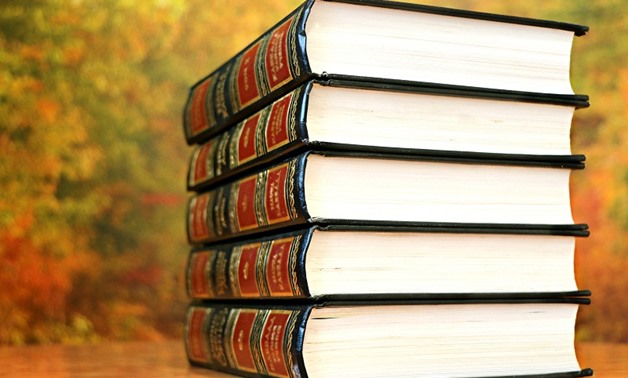
Stock image of books, September 14, 2016 – Pexels/Pixabay
CAIRO – 27 April 2018: Egypt Today looks at 10 Egyptian novels which have received film/TV adaptations.
"The Blue Elephant"
Ahmed Mourad's 2012 psychological thriller novel was adapted by director Marwan Hamed into a critically acclaimed 2014 film that proved to be a local sensation, drawing attention for its unique blend of drama/horror/mystery genres which had never been done before in Egyptian cinema. The plotline follows Dr. Yehia, a psychotherapist who returns from a five-year absence at Al Abbasia hospital following the death of his wife and son. Assigned to work on the criminally insane, he discovers that his best friend, Samir, is being held for murder. Determined to find out the truth, Dr. Yehia enters a rabbit hole where the line between reality and nightmare blur.
"The Lamp of Umm Hashim and other stories"
A 1943 collection of short stories of Yahya Hakki that explores the cultural differences between the east and west, the titular "Lamp of Umm Hashim" story follows a young Egyptian studying to be a doctor in England, who returns to Egypt and finds he wishes to apply what he learned to his native culture, struggling up against Egyptian traditions. It was this story that was adapted into a film in 1968 by Kamal Attia.
"Hepta"
A 2014 novel by Mohamed Sadeq which explores the seven stages of love through the lives of four men, and was adapted into a 2016 film by Hady El Bagory called "Hepta: The Last Lecture", which became one of the highest grossing romantic films in the history of Egyptian cinema.
"The Yacoubian Building"
A controversial novel not afraid to discuss taboos and criticize Egyptian society, this 2002 novel by Alaa al-Aswany followed the lives of various people within the titular Yacoubian Building in Downtown Cairo. A film was released in 2006 based on the novel by director Marwan Hamed, and starred various Egyptian stars such as Hend Sabry, Nour El Sherif, Yousra, Khaled Saleh and much more.
"Palace Walk"
From Egyptian master of literature Naguib Mahfouz, this is the first installment of his critically acclaimed "Cairo Triology". Readers are taken back in time through 1917 to 1919, where Mahfouz explores the massive political and societal shifting that occurred as a result of World War I and the revolution against the British. It was adapted into a 1962 film by Hassan Al Imam.
"Palace Desire"
The second book in Mahfouz's "Cairo Trilogy” explores the personal troubles of a wealthy aristocratic family in Egypt and the political turmoil of 1920s Cairo during the Colonial era. It's film adaptation was directed by Hassan Al Imam in 1967.
"Sugar Street"
The final installment of Mahfouz's "Cairo Trilogy", which sees its central character aging and sick, yet through his three grandsons, is able to see the rise of modern Egypt, each living their own complex and twisting lives. It was adapted into a film in in 1973 by Hassan Al Imam.
"The Open Door"
Latifa Al-Zayyat's novel takes place in 1952, and explores the rise of Egyptian nationalism against the youth of Egypt fighting for freedom, women's rights and a better future. It was adapted into a 1963 by Henry Barakat, starring Faten Hamama, Mahmoud Moursy, and Saleh Selim.
"A Sparrow from the East"
Another tale of Egypt meets Europe, this time from master Arab author Tawfik Hakim, which follows a young Egyptian man's encounter with love in Paris and the conflicts of culture he faces. The 1938 novel was adapted into a 1986 film by Youssef Francis.
"The Call of the Curlew"
This novel by Egyptian master of literature Taha Hussein is the story of a young peasant girl named Amna, who suffers hardships but eventually marries into wealth, only to find that her life doesn't necessarily get better even with all the money in the world. It was made into a 1959 film by Henry Barakat.

Comments
Leave a Comment